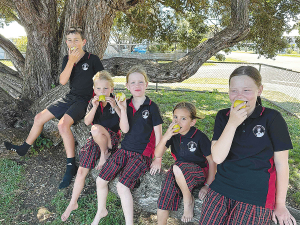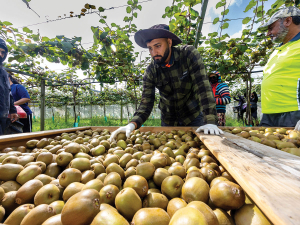Now in its 20th year, the Fruit in Schools (FIS) programme is playing an increasingly vital role in supporting children facing hunger.
Launched in 2005, FIS is funded by Health New Zealand and delivered by United Fresh New Zealand Incorporated, a not-for-profit, fresh produce industry organisation.
The programme provides daily fresh fruit and vegetables for Year 1-8 children in schools in high deprivation areas, supplying fresh fruit to over 126,000 students and educators across a quarter of New Zealand's primary schools.
FIS project manager Stephanie Wrathall says the programme has become a critical lifeline and the rising issue of food deprivation among students, as the Government's revamped lunch programme tries to fix ongoing issues.
She says the urgency of FIS's mission is underscored by alarming findings from the Salvation Army's 2025 State of the Nation report which highlights a dramatic rise in food insecurity.
One in four households with children now reports going without food 'sometimes' or 'often', with Pasifika families experiencing even higher levels of deprivation, with one in two saying they go without food regularly.
"It is a bleak picture and something everyone should be deeply concerned about," says Wrathall.
"We are seeing a rise in food insecurity like never before. But FIS is making a real difference. Our 2022 breakdown showed over 50% of FIS students are Māori and over 30% are Pasifika, proving the programme is reaching those who need it most."
Although 90% of the 565 schools involved also participate in the government-funded school lunch scheme, Wrathall says many principals report that the provided meals lack fresh fruit. Feedback gathered from schools shows how essential FIS has become to support classroom learning, boost attendance and foster healthy eating habits in the wider community.
Papatoetoe East School deputy principal, Philippa Cowper, says FIS is an essential part of the daily routine.
"It provides an additional source of nutrition for many of our students, especially those who don't always have breakfast in the mornings. It also exposes all our students to different fruits that they may not always have access to and discover they enjoy."
FIS delivers fresh fruit in an economically efficient way, sourcing it through wholesale members of United Fresh New Zealand Incorporated and creating an economic boost and employment in our most deprived regions.
United Fresh president, Jerry Prendergast, says a comprehensive evidence review of FIS was conducted last year by The AgriChain Centre last year. It found the programme worked well, the supporting logic is sound and its current operation was effective and efficient.
Prendergast points out there is also a direct correlation between hungry bellies and student achievement. The Program for International Student Achievement (PISA) began measuring food poverty in 2022 alongside maths, science and reading proficiency levels. It ranked New Zealand second worst in the OECD for the number of students missing meals due to lack of money.



















